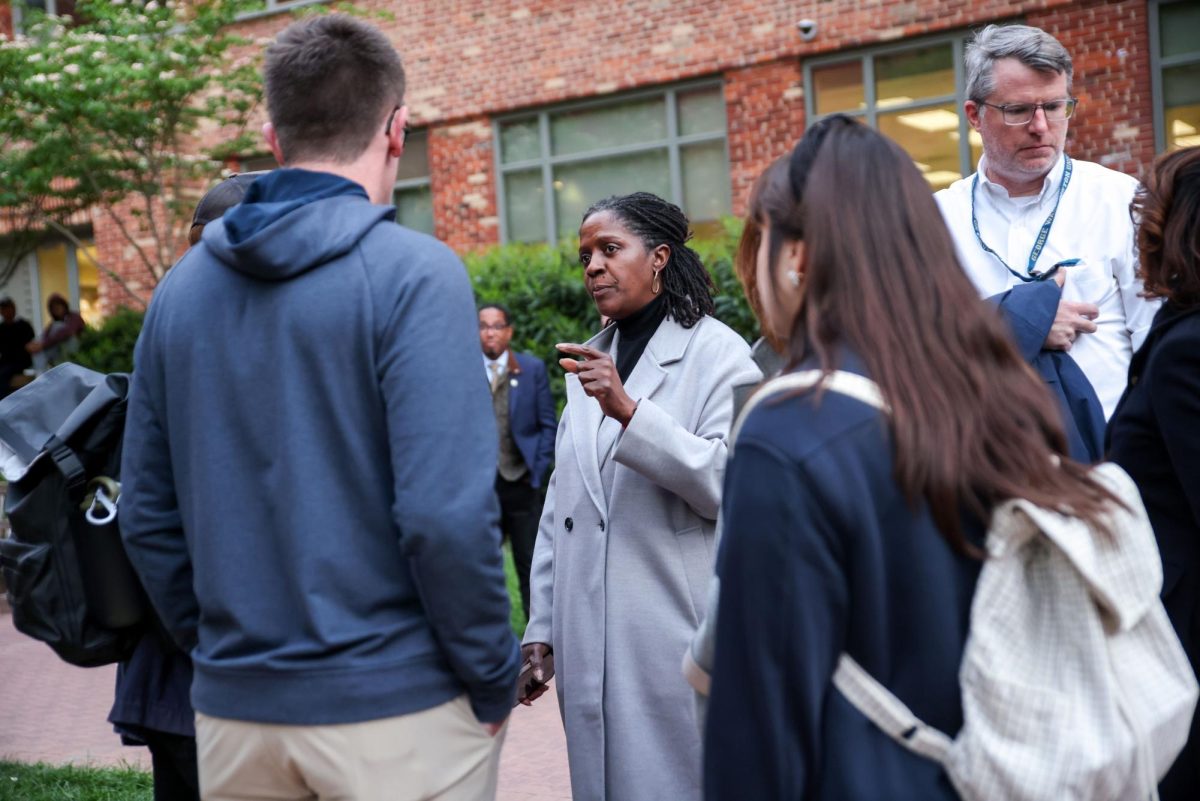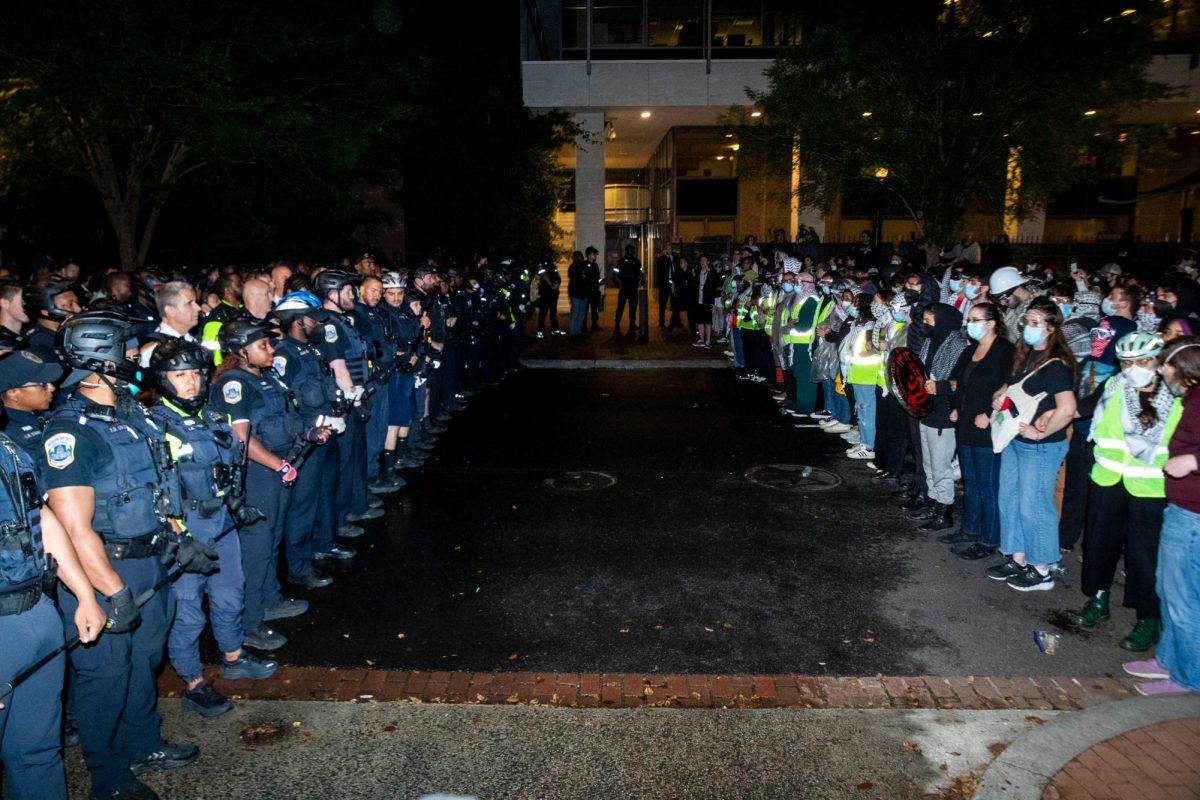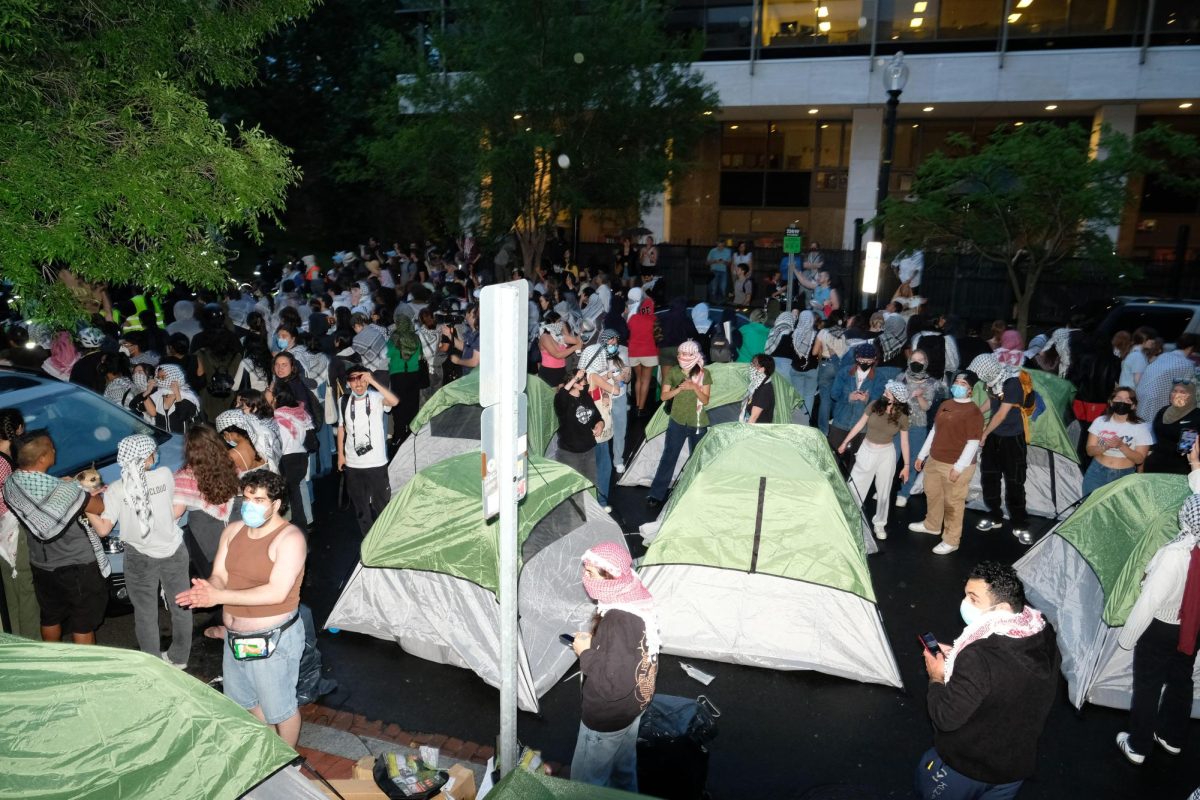This column almost didn’t get written because I went out drinking last night. You know how it goes – I started out at Lauriol with dinner and some margaritas and found myself trolling the streets of Adams Morgan at 3 a.m. stuffing my face with Jumbo Slice.
While that’s how Saturday nights go here for a lot of seniors, it always hurts the most for me the next morning. I’ve been showing up to Hatchet staff meetings Sundays at noon head pounding, hair in knots and feeling like I was going to vomit for the last hundred or so of my weekends in college.
Since I became an editor, Sundays (and sometimes Wednesdays) have been centered around survival. They’ve been days of trying to hold my food down while simultaneously trying to put out a newspaper.
But even after editing stories, calling reporters, figuring out how to get a photo, writing headlines, proofreading and helping make sure it all looks good on the page while also battling a massive hangover, I always leave the office Sunday nights after production with a strange sense of satisfaction. I smile to myself on the walk back to my dorm, I guess because by doing my part to help put out tomorrow’s paper I feel like I am making a difference.
Maybe it’s not as big a difference as I imagine it. Maybe only a handful of people turn to the Life section Monday mornings to read thoughtful trend pieces or intriguing student profiles or find out who “Eve” had sex with last.
But even if that’s the case I would still be satisfied. I think it’s the same with most journalists – they are trying to tell stories that shed light on a larger truth and have an impact on someone, even if it’s just one person.
I got into journalism because my history professor in the ninth grade was trying to build up the program and noticed I could write a coherent sentence. I don’t think I’d ever picked up a newspaper or turned on the news before then – I was a self-centered high school student who cared more about who I sat next to in the cafeteria than what was going on in the world.
But my mom made me join. She told me you don’t pass up experiences like that and I should be honored my teacher thought I was a good writer.
I ended up being editor in chief my senior year of high school. While other people were partying and celebrating prom, I was taking notes and asking people to send me their pictures for the two-page spread we were doing. Next fall, I came to GW majoring in journalism because it was the only thing I was actually good at and enjoyed doing at the same time.
In journalism classes here they teach you about history, theory and the rules of the written word, but my real education has been at The Hatchet. Freshman year I walked into the townhouse at 2140 G St. and they assigned me to the metro editor Michael Barnett, a socially awkward and uncomfortable person, but possibly the person who turned me into a real writer.
My first story for him was to cover an event at the National Press Club downtown. I was one of maybe six people who attended the event on Pulitzer prizes, and definitely the only one under 50, but I still sat there with my notebook, scribbling away.
I ran home after it was over, wrote up the story and clicked the send button on the e-mail, excited I had written my first piece of college journalism. That story never saw the light of day. It might have gone online, but I can’t even remember as much. In fact, Barnett assigned it to me knowing he wasn’t going to run it. It was a test to see if I could actually write.
But even though it didn’t go into print, my story made an impact. It showed Barnett that I had potential and he sat down with me and showed me every little change he made and why. Actually, he did that with every story I wrote for him my freshman year.
And while at times I was annoyed I had to walk from Thurston to The Hatchet townhouse at 11 p.m. to sit with him for 15 minutes as he told me why I should capitalize “University” when referring to GW but keep it lowercase when I am talking about colleges in general, it ultimately made me a better writer (Barnett, don’t let these compliments go to your head or mistake them for evidence that I actually enjoyed you being my editor).
Three years later, I’m about to graduate college after spending a year as a beat reporter covering the community, a year as metro editor, where I would always get that phone call in the middle of the night to go cover a fire that was always a false alarm, and a year as features editor.
Each of those years I remember cursing the paper for the long nights and time it took away from being with my friends at parties or the bar – though I did always reward myself on Saturday nights after I finished editing.
But even more, as time went on, my job at The Hatchet became the butt of my friends’ jokes. They’d ask why construction is going on and I’d bust out with the details, down to when the zoning permits were passed by the city. They’d laugh, call me a loser or mock me (one of their favorite lines: “This one time, at Hatchet camp…”). While they were supportive of my decision to work here, they didn’t get what I saw in it because I was always complaining. Sometimes I didn’t even get what I saw in it.
“Why even do it?” they would ask when I counted down how many issues we had left until the end of the semester. But then I’d remember the story I wrote on the GW students who came back from the war in Iraq or the story I wrote after talking to New Orleans refugees being put up at the D.C. armory following Hurricane Katrina and smile. Those stories meant something to me. I was able to explain to readers the importance of these people’s experiences.
And as I’m about to wrap up my time here at GW and The Hatchet, I realized that’s why I love journalism and the paper. It lets me write for significance. It lets me voice and characterize people who don’t have a microphone of their own.
Even though I thought I wouldn’t, I’m going to miss The Hatchet and all of the wonderful, talented people who devote their time to it. Marissa, I couldn’t have done it this year without you and your creative story ideas. You’ve been a great friend and I think we made an excellent team this year. Gabe, Kyle, Jake and Claire, yelling among all of you at ed board were some of my favorite times in the office this semester. Caitlin, thanks for your support with everything this year. Erin, I know how hard feature photos are and you always seemed to pull it off. Allie, I know I constantly frustrated you by making you wait around … hopefully Brittany will have things more together than I did.
Ryan, though you quit on me this year and I’ve never fully forgiven you, I also want to thank you. You are a talented writer who has taught me so much. I wouldn’t be surprised if we ended up working for the same news organization, since it always seems to work out that way. I’ve learned from all of you and can’t wait until years from now when I’m reading your stories on the front page of The Washington Post. I know you will all go on to amazing careers.
In the meantime, though, I have three weeks of freedom. You’ll find me at the bar getting in quality drinking time with my friends here until graduation, when I’ll have to find a reporting job to fill the void. Cheers.







